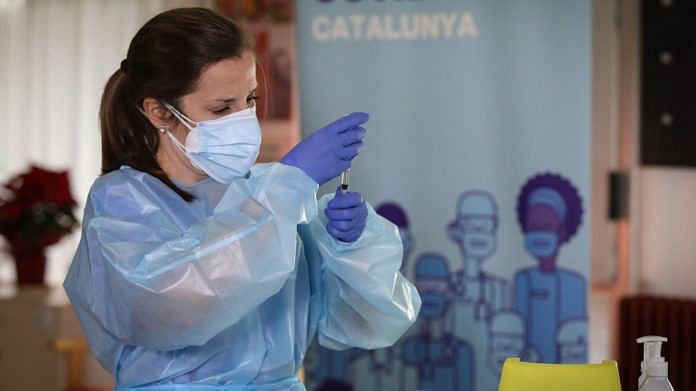
New Delhi: A clinical trial has been launched in the UK to determine the efficacy of inoculating people with two different Covid vaccines for their first and second doses.
The first-of-its-kind study, which is being led by the Oxford University and is funded by the UK government’s vaccine taskforce, will attempt to establish the efficacy of administering two different Covid vaccines to the same recipient.
For the study, the researchers will recruit 820 people over 50 years of age who haven’t been inoculated so far.
During the trial, volunteers will receive a first dose of either Oxford’s AstraZeneca vaccine or the Pfizer/BioNTech vaccine. After which, one group will get an alternative vaccine during their second dose within 12 weeks and the other will get the same vaccine again.
According to experts, if the trial indicates that these vaccines can be used interchangeably, it will aid vaccine delivery.
Matthew Snape, an associate professor in paediatrics and vaccinology at the University of Oxford and chief investigator of the clinical trial, said: “If we do show that these vaccines can be used interchangeably in the same schedule, this will greatly increase the flexibility of vaccine delivery and could provide clues as to how to increase the breadth of protection against new virus strains.”
Trial will study vaccine mixing effect on new strain
According to a BBC report, scientists in the UK believe that this approach of mixing vaccines could give better protection.
For instance, even during the Ebola immunisation programme, vaccines were mixed to provide better protection.
The study is expected to continue for the next 13 months but scientists predict that initial findings could be published by this June. It will also reveal data on the impact of this vaccine on UK’s new SARS-CoV-2 variant.
Furthermore, the study aims to provide insight into the effect of these doses when administered at 4 and 12 weeks.
Professor Jonathan Van-Tam, UK’s deputy chief medical officer, said, “There are definite advantages to having data that could support a more flexible immunisation programme, if needed and if approved by the medicines regulator.”
“It is also even possible that by combining vaccines, the immune response could be enhanced, giving even higher antibody levels that last longer,” he added.
Subscribe to our channels on YouTube & Telegram
Why news media is in crisis & How you can fix it
India needs free, fair, non-hyphenated and questioning journalism even more as it faces multiple crises.
But the news media is in a crisis of its own. There have been brutal layoffs and pay-cuts. The best of journalism is shrinking, yielding to crude prime-time spectacle.
ThePrint has the finest young reporters, columnists and editors working for it. Sustaining journalism of this quality needs smart and thinking people like you to pay for it. Whether you live in India or overseas, you can do it here.